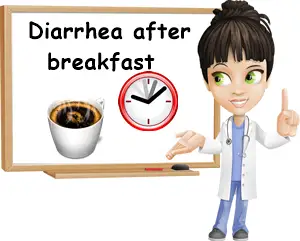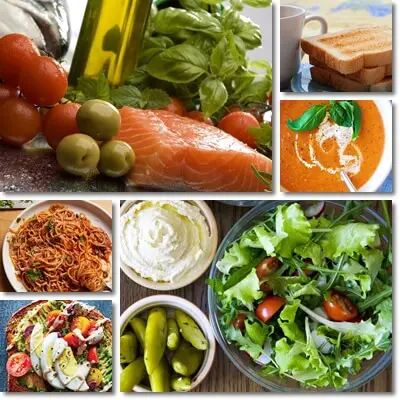Diarrhea after eating can happen to anyone at any time. Sometimes it’s infectious in which case nausea, vomiting and fever may also occur. Other times it’s a reaction to either a high fiber intake, eating too much fat, mixing foods that don’t go well together or eating problematic foods that you may have a bad reaction to although they are otherwise healthy. Diarrhea after eating can occur after breakfast, lunch or dinner and can appear as loose, mushy, poorly formed stools or watery stools. In other to understand what may be causing it, it is important to look at your diet from the past few days and the day before and try to remember what you ate. If you cannot identify potentially problematic foods that give you diarrhea every time after eating them and experience constant diarrhea after eating, it is best to see a doctor.
1) Diarrhea before or after breakfast
You may experience the need to have an urgent bowel movement first thing in the morning when you wake up or after breakfast. If it’s normal, then it just means your regular. If it’s diarrhea, you could have had too much fiber the day before and transit time would have been shortened by a few hours as a result. And a fast transit causes stools that are too loose. If it’s not fiber, an urgent, upon waking bowel movement could have been caused by eating something spoiled or something that wasn’t particularly fresh in the days leading to the diarrhea episode.

You may have caught a stomach bug or stomach virus and the infection just happens to produce symptoms one day before or after breakfast. If it’s gastroenteritis, you should be experiencing symptoms such as fever that day as well, even loss of appetite, nausea or vomiting and need to see a doctor. Or it may be the coffee which shortens transit time and can cause loose stools, even diarrhea soon after breakfast. It could just as well have been the sweetener you used for the coffee which may have contained sorbitol, known for its laxative properties.
Mixing coffee with orange juice or yogurt with orange, carrot, beet or other juices or eating a food you may be intolerant to such as avocado, lactose containing yogurt or sensitive to such as bananas are also potential causes. It may be a reaction to having eaten honey or the lard in bacon smoothing things along maybe too much. All of these are common causes of diarrhea after breakfast. And then there are the less common causes of diarrhea after eating: problematic foods. Each and every one of us may be intolerant or more sensitive to certain foods or compounds in foods and this can translate into stomach upset, disrupted digestion and loose stools and diarrhea.
List of foods known to cause diarrhea:
1) Apples, dried plums, peaches and apricots: they contain sorbitol with naturally laxative properties.
2) Almonds and almond milk: it’s may be the fiber or the additives in almond milk.
3) Avocado: some people feel sick after eating avocado for various reasons. Read about the 8 Side Effects and Contraindications of Avocado.
4) Bananas: often times, unripe bananas or bananas that are too ripe (with multiple brown spots or turning black and developing a fruity-alcoholic smell) can cause diarrhea after eating.
5) Pears with skin can lead to loose stools in those who do not usually eat them whole.
6) Morning cereals: the unhealthy ones may encourage loose stools because of sorbitol sweeteners; healthy morning cereal may cause diarrhea after breakfast if they contain oats, corn flakes or wheat (high fiber intake, gluten intolerance, sensitivity to corn, cross-contamination with other grains etc.).
7) Dried fruit which a lot of people add to their morning cereal can cause diarrhea after breakfast in those sensitive to additives like sulfur dioxide in raisins, dried peaches or apricots, for example. Sulfur dioxide in dried fruit is bad for you because it may cause gas, stomach upset, diarrhea and more serious allergic reactions. Read more about the 8 Side Effects of Dried Fruits and Nuts.
8) Probiotic dairy: yogurt, buttermilk, soured milk, kefir, all fermented cheeses, although healthy because they contain live beneficial bacteria to boost healthy gut bacteria populations, may also easily cause diarrhea after breakfast.

2) Diarrhea after lunch
Having a bowel movement after lunch is caused by the newly ingested food pushing the digested one down the food tract and out. This is true especially if you’ve eaten a large meal at lunch and even more so if you’ve also had a hearty breakfast in the morning. But if you tend to eat a lot, chances are you may mix foods that don’t go so well together, like yogurt and orange juice, cereals with milk and apple juice at breakfast or coffee right before lunch and a soda at lunch. Some foods just don’t get along and can lead to stomach upset and loose stools.
Too much fiber from a whole grains breakfast and lunch salad with nuts and even too much fat, combined with coffee or caffeinated beverages, fruit juices and dairy are not good combinations and can easily cause diarrhea sometime after lunch. Diarrhea after lunch can be a result of a stomach bug or virus you’ve caught the previous day that happens to be manifesting right then. If it’s infectious diarrhea (gastroenteritis), you should be experiencing telling symptoms like nausea, vomiting, fever, loss of appetite too.
3) Diarrhea after dinner
A large dinner can easily trigger a diarrhea episode. It may be that you had something with lots of fat, like a burger with fries or chicken wings, pizza, a couple of slices of delicious pie we all know is made with lard, margarine or generous amounts of other fats to make the dough crumbly and tender. If you are working a late night, maybe you had a couple of espressos, a coffee with milk in the morning and one in the afternoon, some soda and an energy drink. Or you used sorbitol sweeteners for your coffee or tea or chewed a lot of sugar-free gum. Or it could be that avocado toast you had for breakfast which didn’t sit quite right with you and is just starting to show at the end of the day.
Who knows, that lunch you had at the new place or the hot dog from the street vendor weren’t quite fresh or sat for too long unrefrigerated. And did you wash your salad well? Lettuce, spinach and all greens can easily be contaminated with E. coli or other bacteria and even intestinal parasites. Maybe someone at work had infectious diarrhea and you didn’t even know and at the end of the day you realize you’ve also caught that nasty bug. Or did you have some more dried plums during the day because you felt like they weren’t working, although you’ve ate some yesterday and maybe even the day before?
Whatever the reason, diarrhea after dinner is likely caused by unfortunate combinations of foods and beverages you had during the day, something not so fresh you ate in the days leading to the diarrhea or just the coffee, green tea or pineapple you had after dinner. I’ve often gotten diarrhea after dinner if I’ve had a late coffee and especially coffee after dinner. It may take an hour or two, but it’s sure to occur. You can get diarrhea after dinner if you’ve had too much fiber during the day like maybe ate almonds, walnuts or chocolate with peanuts.
Some people get diarrhea after eating apples, almonds, peaches, pineapple, beet or carrot juice, dried plums or even pizza. And it can occur late at night, after having dinner, although you may have eaten one of these potentially problematic foods at breakfast, lunch or as a snack in the afternoon.
Other examples
Causes of diarrhea after eating are diverse and not that easy to determine.
Diarrhea immediately after eating could occur because of a stomach virus or stomach bug, also known as gastroenteritis. This particular infection makes it almost impossible to keep solid food and sometimes even water down in the first 24 hours or up to 3 days.
Diarrhea although not eating can also be a result of a gastroenteritis because, even though you may not eat anything for a few days even, the body is working to eliminate the infectious agent either through diarrhea or through vomiting.
A possible side effect of taking antibiotics is getting loose, mushy, poorly formed stools or watery stools.
Diarrhea after eating eggs can happen if the eggs are not fresh, have stayed out for too long or are contaminated with Salmonella or other bacteria. Similarly, diarrhea after eating fish, shellfish or crustaceans can easily be a result of these foods not being fresh, being insufficiently cooked, improperly handled or contaminated with bacteria or even parasites or a sign of an allergic reaction which requires immediate medical attention.
Gas and diarrhea after eating may indicate food sensitivities or an intolerance to certain foods or cna be a result of eating too much fiber. Sometimes, a food intolerance is not apparent because you may be intolerant of a certain compound that occurs in different kinds of foods like inulin in garlic, onions, coffee substitutes like chicory root and dandelion root, jicama, Jerusalem artichockes, globe artichokes, Echinacea or bananas and plantains (read more about the Difference between Banana and Plantain).
Constant diarrhea after eating is a sign of poor gastrointestinal health and may indicate inflammatory digestive conditions such as irritable bowel syndrome (the type with predominant diarrhea), colitis, ulcerative colitis, Crohn’s disease or an intestinal parasite infection. In some cases, allergic reactions to food also produce diarrhea. Because it upsets hemorrhoids, causes dehydration, disrupts normal eating and reduces quality of life, it is recommended to see a doctor if you experience frequent diarrhea that you cannot manage on your own.
